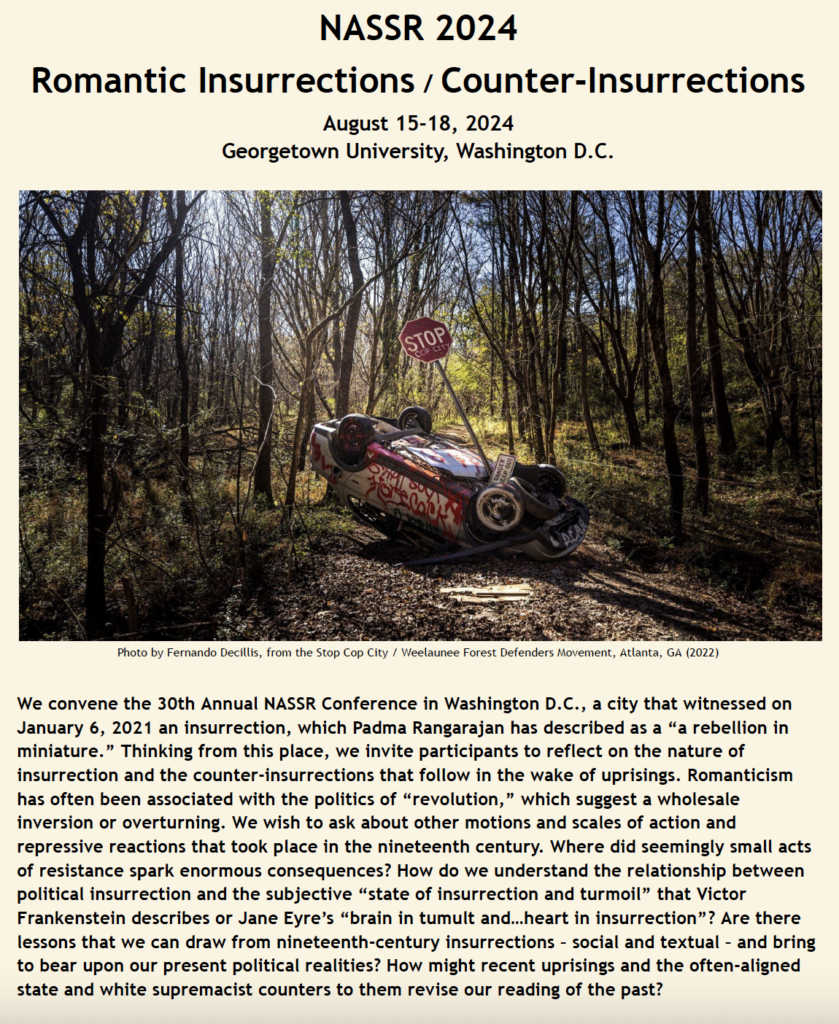2024 North American Society for the Study of Romanticism Conference, “Romantic Insurrections/Counter-Insurrections
From August 15 to 18, Georgetown University hosted the 2024 North American Society for the Study of Romanticism (NASSR) conference, “Romantic Insurrections/Counter-Insurrections,” organized by Professor Manu Chander. It welcomed over 250 in-person and virtual attendees from across North America and the U.K. as well as Mexico, Japan, New Zealand, Singapore, and Qatar.

The 2024 North American Society for the Study of Romanticism (NASSR) conference, “Romantic Insurrections/Counter-Insurrections,” organized by Professor Manu Chander (Department of English), welcomed over 250 in-person and virtual attendees to Georgetown University in Washington D.C.
Presenters traveled from across North America and the U.K. as well as Mexico, Japan, New Zealand, Singapore, and Qatar to discuss nineteenth-century insurrections – political, philosophical, aesthetic – and their twenty-first century afterlives. The organizers were thrilled with the diversity of proposals they received and the quality of presentations, especially from graduate students and early career researchers. Topics ranged from the Brothers Grimm and Charlotte Smith to CLR James and Edward Said; magic and madness to justice and repair; abolition and indigeneity to editing and print production.
Key events included a plenary conversation between Sumaia Haj Mohammad (Birzeit University, Palestine) and Osama Jarrar (Arab American University of Jenin, Palestine), moderated by conference co-organizer Lennie Hanson, who also led with Suleiman Hodali a seminar on Palestine in the nineteenth-century classroom. Other seminars were devoted to aesthetics and queer historiography, markets big and small, and life-writing and African American literary theory. At a workshop led by Emily Friedman and Emily Kugler, participants had the opportunity to test out and reflect on the pedagogical possibilities of video and tabletop games representing the Romantic Era.
Padma Rangarajan, Saree Makdisi, and Grégory Pierrot delivered keynotes on the eighteenth-century Indian king Veerapandiya Kattabomman, John Clare and primitive accumulation, and the Haitian Marie Antoine Nicolas Alexandre Robert Jachin de Sainte Rose Roume de
Saint Laurent, respectively. One attendee said they were “the three most powerful keynote speakers I have heard,” adding that, “[e]ach talk was brilliant in itself but they also spoke to one another and to [the conference] theme.” Professor Rangarajan’s talk was followed by an opening reception, during which the NASSR Board recognized Tilottama Rajan’s long record of service to the organization. The winners of several prizes were also announced. Kaushik Venkata was awarded the Graduate Student Essay prize for “Lascar, Liberty, and Para-Lyric,” and Christopher Cappello was named runner-up for “Scott’s Redgauntlet and the Exhaustion of Insurrection.” The Studies in Romanticism Prize was given to Eric Gidal for “Watershed Communities: River Systems in Coleridge and Geddes,” and the Frederick Burwick Article Prize from European Romantic Review went to Carolin Boettcher for “‘But Poets Have Never Been Botanists’: The Literary Herbarium in Charlotte Smith’s Poetry.”
The conference was positively received, and the most consistent feedback was that attendees appreciated the inclusiveness. “This conference,” wrote one attendee, “was full of exciting, challenging, forward-looking work, much of it pushing beyond the focus on white writers that can so easily dominate this field.” Another wrote, “It’s been a long time since I walked out of a conference feeling invigorated and inspired, and actually hopeful about the future of our discipline,” and a third noted that they “have been attending conferences for 30 years, and this was the rare academic conference that combined political urgency, meaningful inclusion, and the pleasure of work and/with community.”
The success of the conference was largely due to the numerous units and programs at Georgetown that, in addition to the Georgetown Humanities Initiative, supported the event, including the Office of the Dean of the College of Arts and Sciences, the Prince Alwaleed bin Talal Center for Muslim-Christian Understanding, the Center for Contemporary Arab Studies, the Center for the Study of Slavery and Its Legacies, the American Studies Program, the Georgetown–Howard Center for Medical Humanities and Health Justice, the Department of English, and Global Irish Studies.